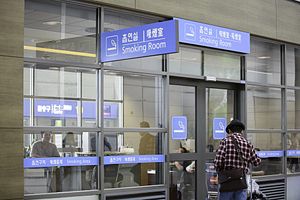Bhutan was the first country to ban the sale of tobacco and public smoking altogether. Turkmenistan has banned it in all places other than the home. South Korea is also about to ban smoking in your own home if you live in an apartment building.
Taxis and buildings are Korea’s new anti-smoking law targets. Taxi drivers have been banned from smoking since 2013, but laws did not specify that clients could not smoke. As for apartment buildings, many were built in the 1980s when Koreans still lived in apartments with their extended families. Korea, with one of the highest population densities in the world, tends to have small apartments with no balconies, and the smoke can easily move to neighboring apartments, causing disputes. A bill has been drafted to ban smoking in taxis and apartments, but no date has been set for the effective ban.
Unlike France where bars and restaurants were given three years’ notice before smoking bans were implemented, South Korea gives much less warning. In December 2012, all restaurants and bars were given a little less than one week’s notice that any establishment with a floor area exceeding 150 square meters could no longer allow smoking. On January 1, 2014, the ban was extended to floor areas exceeding 100 square meters. Rumors and the press say in 2015 the ban will be extended to all bars and restaurants, and that coffee shops will have to remove their smoking booths. Korea’s National Assembly has been ambiguous about its intentions as a bill has yet to be drafted.
South Korea used to be a smokers haven until a little more than two years ago. Most bars and restaurants used to allow smoking as well as many enclosed areas. Cigarette prices increased 10 percent in 2002 and 15 percent again in 2005, with no subsequent hike until 2011 when prices were hiked 5 percent, leaving the average pack at 2,500 won (about $2.50). Adjusted for inflation, real cigarettes prices have actually fallen as salaries kept increasing.
In 2012, a World Health Organization conference held in Seoul encouraged South Korea to do something about its lax laws on smoking and drinking, citing public health issues. South Korea ranks 13th in the world in terms of cigarette consumption, and second among OECD nations behind Greece. Korea’s popular liquor, soju, is the world’s best-selling liquor despite being hard to find in some other countries. South Korea also ranks among the top twenty countries in the world in terms of alcohol consumption, mainly behind Eastern European countries.
South Korea’s cigarettes are among the cheapest in the world if purchasing power parity is taken into account, and until recently Koreans could smoke anywhere they wanted. An increasing number of women have picked up their habit. This despite the fact that until a few years ago women who smoked before menopause were frowned upon, although there was no stigma for older women.
Recently though, despite very few anti-smoking campaigns, Koreans have started raising their voice against second-hand smoke. Korea’s most densely populated streets banned smoking altogether, including the street leading to Gangnam subway station, and most streets surrounding universities, which tend to be very crowded. Before a bill was even drafted to ban smoking in apartment buildings, several building owners had banned smoking in their buildings, including in tenant’s homes, citing concerns with second-hand smoke.
Smokers who live in apartment buildings find it increasingly difficult to smoke, despite cigarette prices being very cheap. There are often no benches outside apartment buildings, many entrances have also banned smoking, and with Korea’s rainy summers and very cold winters, smokers have no choice but to go to a coffee shop to light up.
Most countries hiked prices to reduce the smoking population. So far, Korea has kept prices steady, but it has started banning smoking in many places. Still the number of smokers has increased, as an increasing number of young women have picked up the habit. Though underage smoking is illegal, it is widespread, as middle and high school students often ask older friends to buy them cigarettes. The mandatory military service is usually the time when Korean men start smoking, and despite military PXs no longer selling tax-free cigarettes, many Koreans pick up the habit during their service. Forty-four percent of adult Korean men light up, along with 7 percent of adult women.
Bar, restaurant and coffee shop owners are anxious about the National Assembly’s ambiguity and the relatively short notice they are given to ban smoking in their establishments. They have also been calling for smoking bans to be delayed. Until now, coffee shops and restaurants were allowed restricted smoking zones but they had to be ventilated with air purifiers, and the material to enable such ventilation and air purification could cost as much as $5,000, a large sum for small restaurant and coffee shop owners. Soon, they may have to give them up all together.
Korea may become the first country to legally ban smoking in the comfort of your own home. But the Korean National Assembly’s short notice when implementing laws has made life unpredictable for smokers. Today you can legally smoke in South Korea. Next week, who knows?
































